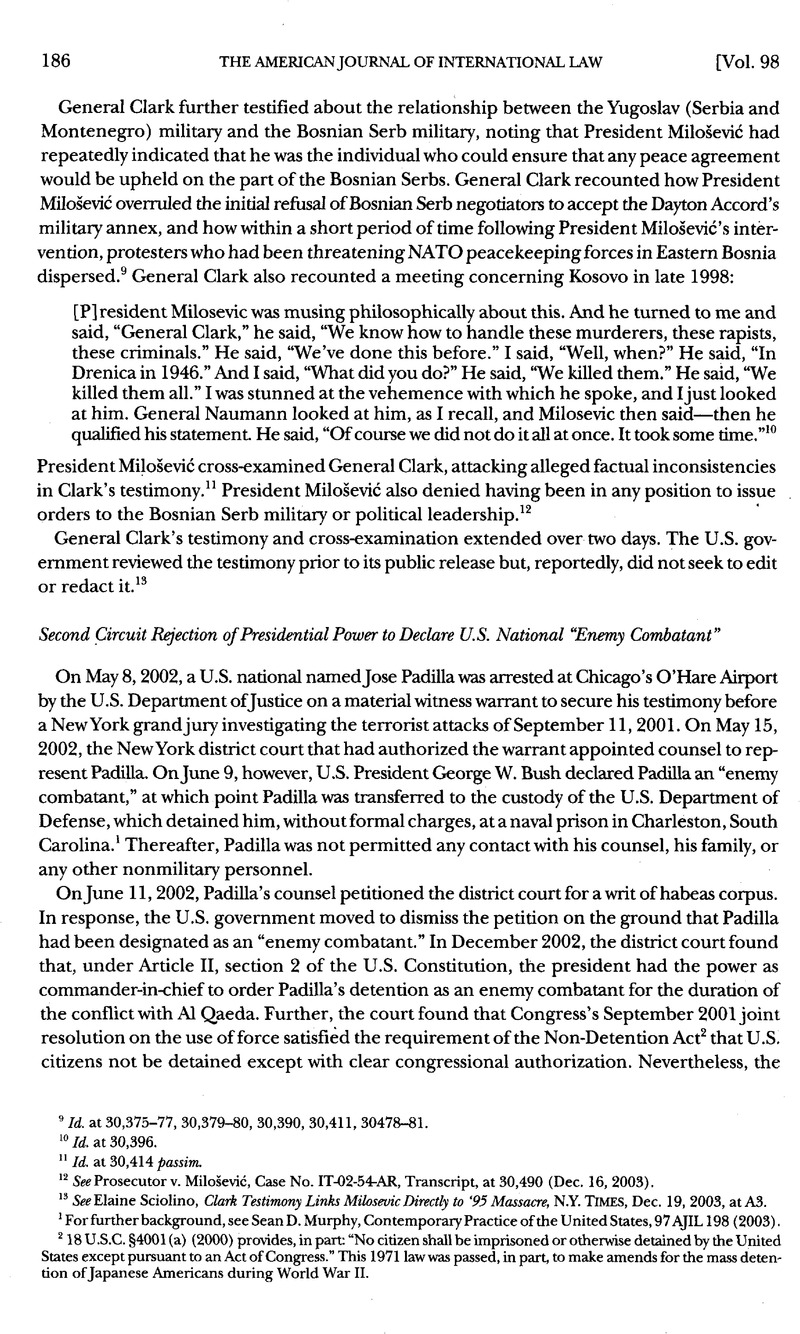No CrossRef data available.
Published online by Cambridge University Press: 16 May 2017

1 For further background, see Sean, D. Murphy, Contemporary Practice of the United States, 97 AJIL 198 (2003)Google Scholar. 218 U.S.C. §4001 (a) (2000) provides, in part: “No citizen shall be imprisoned or otherwise detained by the United States except pursuant to an Act of Congress.” This 1971 law was passed, in part, to make amends for the mass detention of Japanese Americans during World War II.
3 Padilla v. Bush, 233 F.Supp.2d 564, 569-70, 598-99 (S.D.N.Y. 2002).
4 Padilla v. Rumsfeld, 243 F.Supp.2d 42, 43-46 (S.D.N.Y. 2003).
5 Id. at 48-49, 57.
6 Padilla v. Rumsfeld, 352 F.3d 695, 698 (2d Cir. 2003).
7 Id. at 711 (citing Hamdi v. Rumsfeld, 337 F.3d 335, 344 (4th Cir. 2003)).
8 Youngstown Sheet & Tube Co. v. Sawyer, 343 U.S. 579, 635-38 (1952).
9 352 F.3d at 713-14.
10 Id. (citing U.S. Const. Art. I, §8, cl. 10).
11 Id. at 714 (referring to the suspension of writs of habeas corpus and the quartering of troops in a manner “prescribed by law”).
12 Id. at 715.
13 317 U.S. 1 (1942).In Quirin, the Supreme Court denied the habeas corpus petitions of German soldiers who had landed on U.S. soil during World War II (with the intent of committing acts of military sabotage) and shed their uniforms, and who were subsequently captured and tried by a military commission as “unlawful combatants.”
14 352 F.3d at 716.
15 See supra note 2.
16 352 F.3d at 718–21.
17 Id. at 720–22.
18 Authorization for Use of Military Force, Pub. L. No. 107-40, 115 Stat. 224 (2001). The court also found no such congressional approval based upon a statute enacted in 1984—10 U.S.C. §956(5) (2000)—authorizing funding for military detentions. See 352 F.3d at 723–24.
19 352 F.3d at 723 (quoting from Ex parte Endo, 323 U.S. 283, 300 (1942)).
20 Id. (citation omitted).
21 Padilla v. Rumsfeld, 352 F.3d695 (2d Cir. 2003), petition for certiorari filed, 2004 WL 113598 (U.S. Jan. 16, 2004) (No. 03-1027). For the related case of Yaser Esam Hamdi (a U.S. citizen held in U.S. military detention in the United States, but after being apprehended by Northern Alliance and U.S. forces in Afghanistan), see Sean, D. Murphy, Contemporary Practice of the United States, 96 AJIL 981 (2002) & 97 AJIL 196 (2003)Google Scholar. After the Fourth Circuit’s January 2003 decision that Hamdi’s detention was authorized by Congress’s joint resolution, that Hamdi did not have a right under the 1949 Third Geneva Convention to a formal hearing to determine his status as an enemy belligerent, and that reversed the district court’s order allowing Hamdi access to counsel, Hamdi’s counsel filed a petition for rehearing and suggestion for rehearing en banc. On July 9, 2003, the Fourth Circuit denied the rehearing by an 8-4 vote. See Hamdi v. Rumsfeld, 337 F.3d 335 (4th Cir. 2003). The Supreme Court granted a writ of certiorari in the case on January 9, 2004. See Hamdi v. Rumsfeld, 124 S.Ct. 981 (2004).